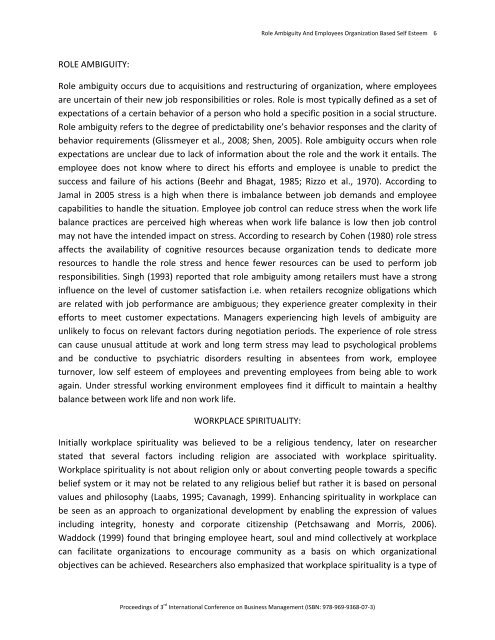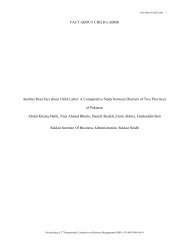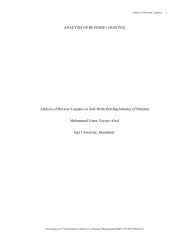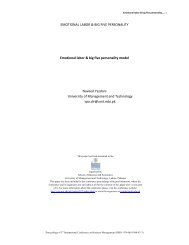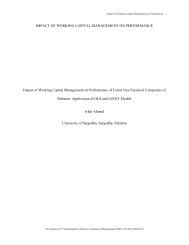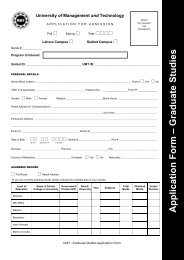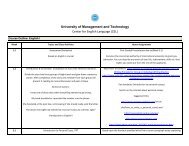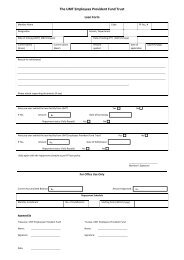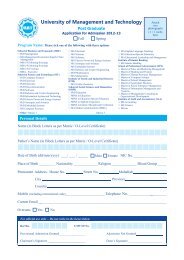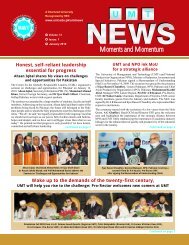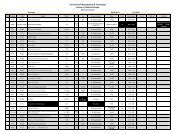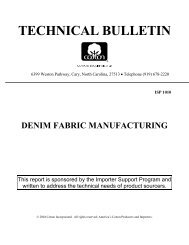Role Ambiguity And Employees Organization Based Self Esteem
Role Ambiguity And Employees Organization Based Self Esteem
Role Ambiguity And Employees Organization Based Self Esteem
Create successful ePaper yourself
Turn your PDF publications into a flip-book with our unique Google optimized e-Paper software.
<strong>Role</strong> <strong>Ambiguity</strong> <strong>And</strong> <strong>Employees</strong> <strong>Organization</strong> <strong>Based</strong> <strong>Self</strong> <strong>Esteem</strong> 6ROLE AMBIGUITY:<strong>Role</strong> ambiguity occurs due to acquisitions and restructuring of organization, where employeesare uncertain of their new job responsibilities or roles. <strong>Role</strong> is most typically defined as a set ofexpectations of a certain behavior of a person who hold a specific position in a social structure.<strong>Role</strong> ambiguity refers to the degree of predictability one’s behavior responses and the clarity ofbehavior requirements (Glissmeyer et al., 2008; Shen, 2005). <strong>Role</strong> ambiguity occurs when roleexpectations are unclear due to lack of information about the role and the work it entails. Theemployee does not know where to direct his efforts and employee is unable to predict thesuccess and failure of his actions (Beehr and Bhagat, 1985; Rizzo et al., 1970). According toJamal in 2005 stress is a high when there is imbalance between job demands and employeecapabilities to handle the situation. Employee job control can reduce stress when the work lifebalance practices are perceived high whereas when work life balance is low then job controlmay not have the intended impact on stress. According to research by Cohen (1980) role stressaffects the availability of cognitive resources because organization tends to dedicate moreresources to handle the role stress and hence fewer resources can be used to perform jobresponsibilities. Singh (1993) reported that role ambiguity among retailers must have a stronginfluence on the level of customer satisfaction i.e. when retailers recognize obligations whichare related with job performance are ambiguous; they experience greater complexity in theirefforts to meet customer expectations. Managers experiencing high levels of ambiguity areunlikely to focus on relevant factors during negotiation periods. The experience of role stresscan cause unusual attitude at work and long term stress may lead to psychological problemsand be conductive to psychiatric disorders resulting in absentees from work, employeeturnover, low self esteem of employees and preventing employees from being able to workagain. Under stressful working environment employees find it difficult to maintain a healthybalance between work life and non work life.WORKPLACE SPIRITUALITY:Initially workplace spirituality was believed to be a religious tendency, later on researcherstated that several factors including religion are associated with workplace spirituality.Workplace spirituality is not about religion only or about converting people towards a specificbelief system or it may not be related to any religious belief but rather it is based on personalvalues and philosophy (Laabs, 1995; Cavanagh, 1999). Enhancing spirituality in workplace canbe seen as an approach to organizational development by enabling the expression of valuesincluding integrity, honesty and corporate citizenship (Petchsawang and Morris, 2006).Waddock (1999) found that bringing employee heart, soul and mind collectively at workplacecan facilitate organizations to encourage community as a basis on which organizationalobjectives can be achieved. Researchers also emphasized that workplace spirituality is a type ofProceedings of 3 rd International Conference on Business Management (ISBN: 978-969-9368-07-3)


